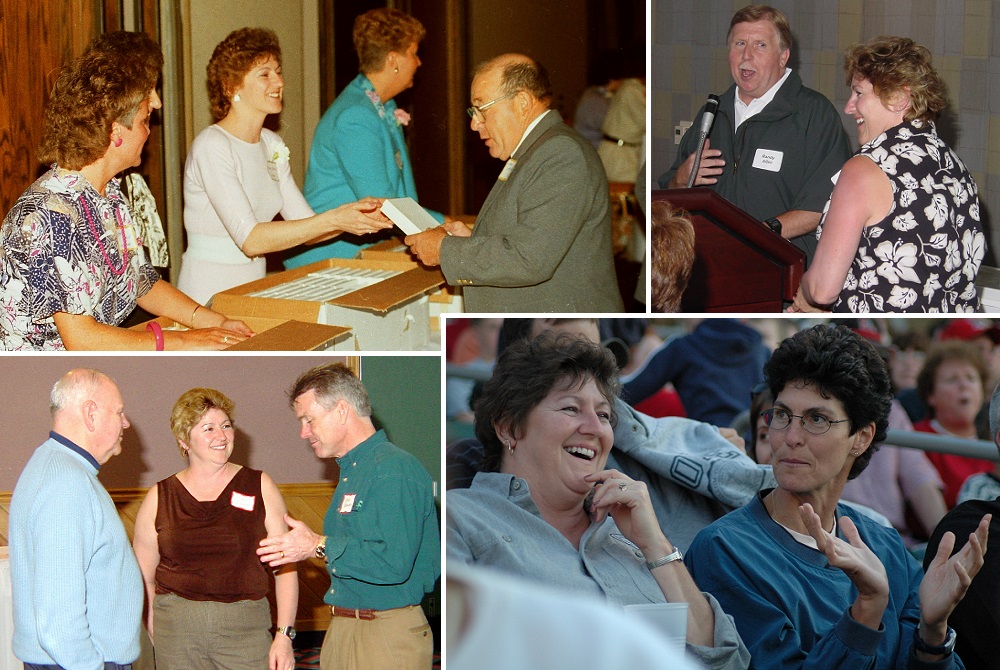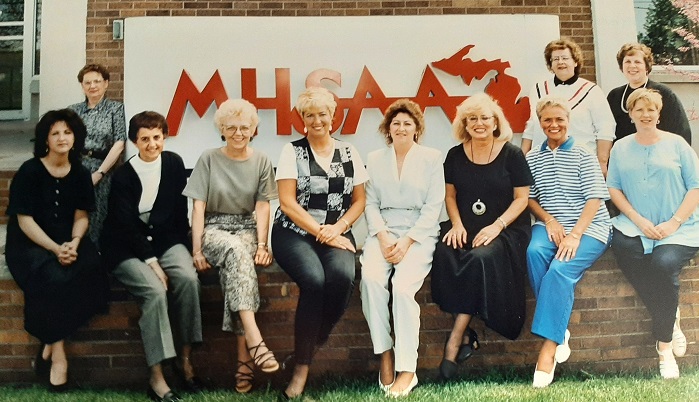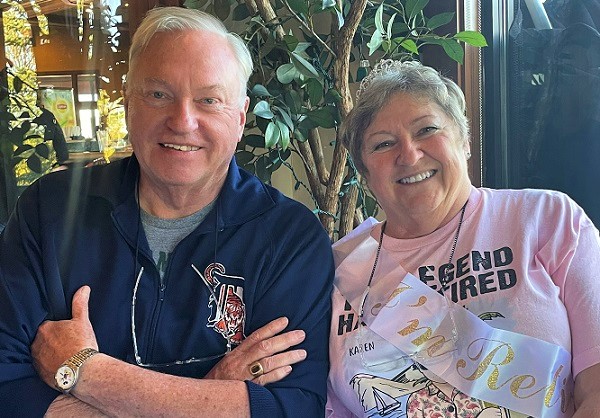
Sorgi-Led Blanket Drive Spreads Support
May 26, 2017
By Geoff Kimmerly
Second Half editor
The design was the same, the pattern was one they’d used, and the little girl had received her blanket right around Christmas while undergoing cancer treatments.
 Nikki Sorgi has no way of knowing for sure if the blanket – described by an aunt who cares for the child during the school day – is one of more than 400 she, her older sister and Utica Ford classmates have donated to University of Michigan’s C.S. Mott Children’s Hospital over the last three years. But that doesn’t matter – the fact that a blanket, any blanket, is bringing a child comfort hits home as Sorgi considers what she’s helped to accomplish.
Nikki Sorgi has no way of knowing for sure if the blanket – described by an aunt who cares for the child during the school day – is one of more than 400 she, her older sister and Utica Ford classmates have donated to University of Michigan’s C.S. Mott Children’s Hospital over the last three years. But that doesn’t matter – the fact that a blanket, any blanket, is bringing a child comfort hits home as Sorgi considers what she’s helped to accomplish.
Sorgi is a recipient of an MHSAA/Lake Trust Credit Union “Community Service Award” for helping spearhead a campaign that stretched over the course of her high school career, with the co-leadership of her older sister Alex (a 2015 Ford graduate) and large contributions from her school’s National Honor Society chapter, student council and school store.
“It was really great to see, from the toy drive we started my freshman year, there are other kids out there who care,” Nikki Sorgi said. “A lot of people have this stereotypical view of teenagers, that they’re more concerned about themselves and what’s going on in their lives. It was cool to see other kids out there who care, who want to make a difference, even if they don’t have the ability to start their own project or event.”
Sorgi this fall will follow her sister Alex to Bowling Green State University, beginning studies toward an eventual career as a pediatrician. Providing care for children has been a major drive in her life since her freshman year, when she and Alex collected 250 toys to donate to hospitalized children.
 About that time, a medical issue struck closer to home – a friend and classmate was diagnosed with cancer. Realizing that a toy drive was great for younger kids but not as much of a help for older ones, the Sorgi sisters turned their focus to creating homemade tie-knot fleece blankets that could comfort patients of all ages.
About that time, a medical issue struck closer to home – a friend and classmate was diagnosed with cancer. Realizing that a toy drive was great for younger kids but not as much of a help for older ones, the Sorgi sisters turned their focus to creating homemade tie-knot fleece blankets that could comfort patients of all ages.
Sadly, the friend who inspired the drive, Stefan Oncia, died after his battle in December 2014. A month later, the first donation of 60 blankets went to Kids Kicking Cancer in Southfield. The following Christmas season, more than 150 blankets were donated to patients at C.S. Mott. This past Christmas, the Sorgis delivered nearly 200 more blankets.
Along the way, Ford’s NHS helped raise funds for materials, and more than 60 students helped assemble them during an after-school blanket-making party. The Bemis Junior High life skills class also has contributed blankets the last two years, and Nikki worked with her travel softball coach to make their holiday gift exchange instead a donation of blankets.
The girls’ mother Roni has had a number of big assists along the way, and that likely will continue with Nikki finishing up high school (she’ll also join her sister playing softball at BGSU). Nikki, a four-year varsity softball and basketball player, said she’s talked to her coach Matt Joseph (who coaches both teams) about ways to continue the blanket drive in the future. Her brother Joey will be a sophomore next year and is expected to pick up the cause, with the sisters returning home at Thanksgiving to help orchestrate the drive with the help of Ford sports teams or NHS if it remains involved.
Nikki will use the award as a scholarship toward paying for her education. Her desire to become a doctor started before she started playing such a large role in bringing patients comfort – but seeing how the blankets have impacted children at the hospital has swayed her toward pediatrics while also teaching her a few lessons in persistence and communication.
“It shows the blanket drive might be one small thing, but it shows how much one small thing can do for people who are sick, or struggling, whatever the case may be,” Sorgi said. “Even though it’s just a small gesture.”
The Community Service Awards are sponsored by the Michigan High School Athletic Association and Lake Trust Credit Union to recognize student-athletes' efforts to improve the lives of others in their communities. In addition to the $1,000 award, the Lake Trust Foundation is awarding an additional $500 to each honoree, to be donated to a non-profit, 501 (c)(3) organization of the awardee’s choice.
PHOTOS: (Top) Utica Ford senior Nikki Sorgi sits in front of a mountain of homemade blankets headed for C.S. Mott Children’s Hospital. (Middle) Sorgi, with older sister Alex (right) and Kevin Smith from Mott community relations, delivers the blankets to the hospital. (Photos courtesy of the Sorgi family.)
2017 Community Service Awards
Sunday: Colon "Yard Squad" - Read
Monday: Bailey Brown, Brighton - Read
Tuesday: Justice Ottinger, Newaygo - Read
Thursday: Katie Sesi, Ann Arbor Huron - Read

Jackson's Imprint on MHSAA Stretches 45 Years, Across 4 Executive Directors
By
Geoff Kimmerly
MHSAA.com senior editor
October 5, 2022
First impressions can be significant, as many a saying goes. And Karen Brown unknowingly provided one in 1978 that helped affect the course of athletics in this state over the next 40-plus years.
A Michigan State University student named Karen Leinaar had shown up at the Michigan High School Athletic Association for a meeting about a 5K road race she was planning that was unrelated to the MHSAA except that the building provided a good meeting place – and Brown, just a year out of high school, was the first person to greet her at the old Trowbridge Road headquarters.
Seeing someone her age immediately made Leinaar more comfortable. She ended up returning to that office several times over the years, registering as an MHSAA game official while still an MSU student and then starting a career in 1982 that has included nearly 40 years as a high school athletic director and two decades of shaping policy as part of the MHSAA Representative Council.
That’s the kind of impact that’s emanated from Karen Jackson, formerly Brown, and over the last 45 years as assistant to four of the five executive directors during the MHSAA’s 98-year history. Jackson finished that run with her retirement Friday.
“She was always one that would welcome you, and whether you walked into the office or called on the phone, she always had an answer that would calm you down or provide you with the information you needed,” said Leinaar, who currently is serving as interim athletic director at Frankfort High School in addition to her duties as executive director of the Michigan Interscholastic Athletic Administrators Association.
“I remember initially calling and needing something from Mr. Norris – it was always Mr. Norris – and she could answer the question,” Leinaar added, referring to retired MHSAA executive director Vern Norris, who served in that role from 1978-86. “You didn’t want to talk to scary Mr. Norris – Vern was a wonderful man, but he was like the superintendent or principal. Karen always had the answer. … It was always that smile that made you feel like you were more than welcomed, wanted in the office, and everything is going to be OK.”
 Jackson began at the MHSAA in June 1977, two days before her graduation from long ago-closed Harry Hill High School in Lansing.
Jackson began at the MHSAA in June 1977, two days before her graduation from long ago-closed Harry Hill High School in Lansing.
Her high school sports career amounted to about half a season on the Hill varsity volleyball team as a sophomore before she had to switch gears to begin working for the Lansing Regional Chamber of Commerce as part of a school co-op program.
Jackson graduated as a co-valedictorian of Hill’s Class of 1977. Despite her academic standing, she hadn’t received much guidance at school on the possibility of college. But she had a job offer from the Chamber – and also had heard from grade-school friend Deborah Norris (Vern’s daughter) about an opening at the MHSAA.
The MHSAA was offering more money, and Jackson was hoping to buy a car – and so at 18, she became the secretary for executive director Allen W. Bush.
The title has changed over the years, from secretary to the executive director, to executive assistant, to senior executive assistant. The MHSAA’s administrative processes obviously have changed, mostly because of technology, from everything done on paper and through the mail to just about everything conducted digitally over the internet.
But many of Jackson’s most important duties at the end of her tenure resembled those she was hired to carry out nearly half a century ago.
Setting Exemplary Expectations
Bush retired a year after Jackson began, and she then assisted Norris for his eight as executive director. She served with Jack Roberts through his 32 years as executive director from 1986-2018 and then for these first 3½ under current director Mark Uyl.
She was considered the “baby” of the MHSAA staff during her first 12 years, until she turned 30 and her support staff teammates declared she wasn’t the baby anymore during a Christmas party serenade. Just about 33 years later, she’s leaving as one of two people left who worked in the old offices before the MHSAA moved to another East Lansing headquarters at Ramblewood Drive in 1996.
School sports happen thanks to a Karen Jackson or two in every community -- people who provide the unseen support that makes these programs possible every day.
For the last 45 years, she’s provided a consistent anchor for service to 1,500 schools and millions of student-athletes across Michigan.
 “She’s shaped so much of what we’ve done,” said MHSAA assistant director Kathy Vruggink Westdorp, who joined the staff during the 2003-04 school year after more than two decades working for Grand Rapids-area schools. “Her service to schools was imperative to what she was doing, and it was a valuable part for our membership. Hers was such a dedicated service, such an exemplary service – finding solutions, to do what’s needed.”
“She’s shaped so much of what we’ve done,” said MHSAA assistant director Kathy Vruggink Westdorp, who joined the staff during the 2003-04 school year after more than two decades working for Grand Rapids-area schools. “Her service to schools was imperative to what she was doing, and it was a valuable part for our membership. Hers was such a dedicated service, such an exemplary service – finding solutions, to do what’s needed.”
There are file cabinets and libraries and hard drives at the MHSAA office, the contents of which are known by only a handful of people on Earth – and Jackson perhaps the most as she did most of the sorting and maintaining of those files over the years.
For a 1996 Lansing State Journal feature on the MHSAA’s support staff, Jackson (then Yonkers) explained “there are always new challenges, new issues and controversies. It never gets boring. In the past 19 years, we’ve slowly shifted from dealing with athletic administrators, principals and superintendents to dealing with legislators, attorneys and courts.”
The last 25 years has seen much of the work swing back to providing service directly to schools. And Jackson’s mind has become part MHSAA library and part card catalog of where to find those few snippets she might not recall immediately from the last half century.
“I guess what I’m proud of is being able to find things, to know where to find things and how to find things that other people don’t,” Jackson said. “Yes, the technology has changed everything. … We used to have more schools – they used to have 40-some Detroit public schools – and there was a whole era of (litigation), but it’s calmed down now.
“I liked what I did, and it kept me on my toes – that’s for sure.”
The MHSAA is rooted in its responsibilities as a championship and eligibility rules maker, and Jackson was involved in just about every communication in those areas during her time. Tournament changes are made at Representative Council meetings, and she’s reported the minutes for at least 150 of those, including piles of special sessions as the MHSAA managed sports through the COVID-19 pandemic. Eligibility waivers are requested at Executive Committee meetings, and she’s prepared somewhere north of 505 sets of minutes for those monthly sessions even as those agendas have grown in content substantially over the years.
Then there’s all of the correspondence from those four executive directors – all with the initials “kb” or “kj” to go with “AWB” or “VLN” or “JER” and “MU.” She also was in charge of MHSAA election ballots for 35 years, served as the lead organizer of cooperative programs, helped with football tickets for a time and briefly was part of the program-selling crew at early Football Finals at the Pontiac Silverdome.
“I think I’m pretty lucky, being on the Council and Executive Committee, that I’ve been able to work with her a lot. And most athletic directors, they may not even know who she is because they may not have contact with her or do anything with her – but she’s obviously been the unsung hero of that office,” said Vic Michaels, who serves as director of physical education & athletics for the Archdiocese of Detroit and has served on the Representative Council since 2003.
“She just does so much that you don’t really know about, especially with the Council. Whenever I need anything, Karen’s the one I call. She is the history, really. She’s the keeper of that.”
Unprecedented & 'Never to be Replicated'
A longtime co-worker of Jackson, Shirley Hytinen, retired in 1998 after just a few months more than 43 years. She too had worked for four executive directors, as she began in 1955 during the Charles E. Forsythe era.
Jackson surpassed Hytinen’s tenure a few years into Uyl’s, and can readily recall some of what stood out from all four directors she’s assisted.
Bush was “really stern” – he had served in the U.S. Marines – and she said he didn’t smile much until the day he announced his retirement, when it was “like a switch turned. He was smiling and happy and joking around.”
Norris was “the sweetest guy in the world.” Jackson had bought her first house in her mid-20s and was preparing to move in with only her dad and his motor home to assist, when Norris showed up to help at 7:30 a.m. that morning to provide another set of hands.
Roberts is known by Michigan administrators and national colleagues for his writing, and Jackson said jokingly she still “cringes” when she sees a yellow legal pad. She was an important proofreader and spent the majority of her career serving with her desk just a few paces away from that of the recent National Federation Hall of Fame selection, and she attended his induction this past summer and San Antonio.
 Roberts pointed out that during the 1980s, the MHSAA would conduct nine Executive Committee meetings, each averaging fewer than 10 requests for waivers. By the end of his 32 years, there were 11 Executive Committee meetings annually – with approximately 50 waiver requests presented on average. Still, he and Jackson were able to process the meeting minutes and continue to distribute those decisions within 24 hours.
Roberts pointed out that during the 1980s, the MHSAA would conduct nine Executive Committee meetings, each averaging fewer than 10 requests for waivers. By the end of his 32 years, there were 11 Executive Committee meetings annually – with approximately 50 waiver requests presented on average. Still, he and Jackson were able to process the meeting minutes and continue to distribute those decisions within 24 hours.
“Over the more than three decades that Karen and I worked together at the MHSAA, the work became increasingly more voluminous and complicated – and Karen kept finding ways to increase our efficiency and maximize our output,” Roberts said.
Like Norris when Bush was executive director, Uyl had been part of the MHSAA staff under Roberts since 2004 before eventually moving into the corner office. After those first 15 years together, Uyl knew what a valuable person he had just a few yards away to assist in his transition, and “he just says to do this” and allows his staff to run with it, which Jackson enjoyed.
Her duties have been shifted confidently, mostly to Jamie VanDerMoere, another longtime administrative assistant who is best-known to Michigan school sports people for her leadership with the annual wrestling championship tournaments.
Jackson recently was married to Jim Jackson, and they have plans as they close in on their first anniversary – they’re hoping to travel to Italy at some point and also The Masters in Augusta, Ga., next spring. “I’m not going to miss coming to work every day, but the people,” Karen Jackson said.
And many in school sports across Michigan, although they may not realize it, will miss the contributions Jackson has made to their community over the decades including the context she’s provided as thousands of decisions have been made.
“Not only her understanding of our regulations and the processes of our regulations, but understanding why we have those things in place – when someone does something 45 years, you get a lot of historical context,” Uyl said. “What’s made her so effective is understanding the why – and that to me is something that’s almost impossible to replace.
“When an organization has been around 98 years with only five directors, it says something to have worked for four out of the five. That will never be replicated again.”
PHOTOS (Top) From top left, Karen Jackson has been a mainstay of the MHSAA for decades – serving membership, working with administrators like Randy Allen and Gina Mazzolini or serving as assistant to executive directors like Jack Roberts (right) and Vern Norris. (Middle) Jackson, sitting fourth from left, was the “baby” of the MHSAA staff after joining when she was 18. (Below) Jackson and husband Jim have plans to travel in retirement. (MHSAA archives.)

